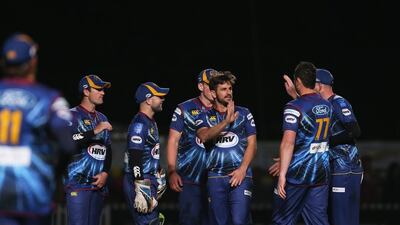As a format it is easy to look down at Twenty20. It is too short. It is too loaded in favour of batsmen. It is too brash and non-serious. It scrambles player techniques and mindsets. It muddles up players’ priorities.
What often goes unheard in much of the debate about cricket’s shortest form, however, is the change it has wrought, or promises to bring, on the second tier of cricket.
From Friday, 16 of the world’s next-best teams – those beyond the top 10 full members – will begin the World T20 Qualifiers across Abu Dhabi, Dubai and Sharjah.
Some will argue that a team like Ireland is probably among the 10 best, anyway, given the problems of Zimbabwe and Bangladesh.
The six top sides from the two groups in the UAE will go to Bangladesh next March, where they will go through another stage of qualification; divided into two groups of four (with the bottom-ranked full members, Bangladesh and Zimbabwe, making up the fourth place in each group), one from each will make it to the main show, the World Twenty20, which begins in earnest on March 21 in Dhaka.
That means, effectively, only two of the 16 teams have a chance to play on the biggest stage with the full members come March.
But that does not stop anyone from dreaming of making the big time, and it is in the shortest format that those dreams can often be the most vivid and most reality-ridden.
Simultaneously, the most complicated and most refreshing thing about the format is that it has blurred lines between the welfare of nationality and that of the welfare of the individual.
In one sense it has merely located the fault-line that has always existed at the heart of the sport: marrying the needs of the individual battle between bowler and batsman at the centre to the collective requirements of two sets of 11 men facing each other.
With Twenty20, however, and in particular the many domestic big-money leagues it has allowed to flourish, playing for your country is no longer the only way to sustain a livelihood, or even the primary platform to remaining in the public eye.
It follows that the World Twenty20, though it remains a very big deal for all associate cricketers, is maybe not as big a deal as it might have been five years ago. In fact, it could be argued that it probably is not the premier Twenty20 tournament in the world in 2014.
Thus, in doing well in the qualifiers, players will not just be helping their side qualify for the tournament – that remains a big incentive, of course – but they might help themselves land a contract with the Indian Premier League (IPL) or the Big Bash League in Australia, or the new league Cricket South Africa are trying to set up.
It has been happening already. The Netherlands’ Ryan ten Doeschate has played and starred for the Kolkata Knight Riders in the IPL. Ireland’s O’Brien brothers, Niall and Kevin, have played in the Bangladesh Premier League (BPL).
Kevin also turned out for Trinidad & Tobago Red Steel this summer, in the first Caribbean Premier League. Afghanistan’s Hamid Hassan and Canada’s Rizwan Cheema have also played in the BPL, a healthy employer of associate talent.
As much as anything, these leagues drive demand. They need players beyond the main, high-tier international talent pool, which, with only 10 full members, is pretty shallow. Moreover, given how packed international schedules are, securing those players is not straightforward. India does not allow its players to appear in any other league. So where do you go?
To end, imagine a world without Twenty20. Would international representation, fleeting as it is on the biggest stages, be enough to sustain or fuel the aspirations of a horde of semi-professional cricketers? Would they be able to give up their day jobs and pursue the idea of making a life playing cricket?
Many probably still cannot. But with these leagues, at least hope remains.
And it will help immensely that the world will have access to these exploits over the next two weeks. Sixteen of the 56 group games will be streamed live on the ICC’s website.
The business end of the qualifiers, the final four days, will be broadcast live on television around the world.
osamiuddin@thenational.ae

